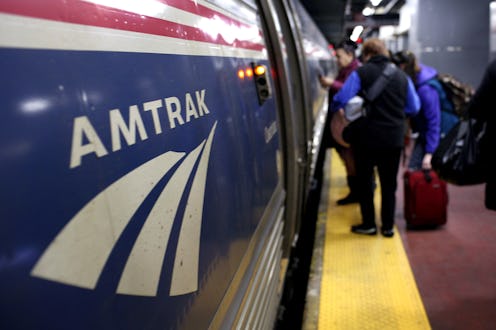News
Amtrak Engineer Brandon Bostian Can't Recall Crash
A traumatic brain injury suffered by the man in control of the crashed Amtrak train is delaying investigation into the derailment, which left eight people dead. Train 188, traveling from Washington DC to New York, went of the rails in north Philadelphia Tuesday. Authorities have said that the train sped up in the last minutes before the crash, eventually going double the speed limit before entering a sharp turn. The accident has shut down much of the Northeast’s rail service and sparked an investigation, but the man who was driving the train at the time of the crash can’t remember anything leading up to the deadly derailment.
Engineer Brandon Bostian is suffering memory loss after suffering a concussion as a result of the crash, his attorney Robert Goggin said in an ABC News interview Wednesday. “I believe as a result of the concussion, he has absolutely no recollection of the events,” Goggin said. “I'm told that his memory is likely to return as the concussion symptoms subside.” Although plenty of commentators have called out Amtrak’s infrastructure problems and funding woes in the wake of the crash, the irregular speed the train was travelling at the time of the crash will make Bostian’s testimony a crucial element of the investigation.
Robert Sumwalt, a spokesman from the National Transportation Safety Board, made this clear when he spoke with CNN's Anderson Cooper Thursday. “Why did that train go from that speed to over 100 mph?” Sumwalt said he’d like to ask Bostian. The train was moving at 106mph before it crashed, while the speed limit for that section of the rails is 50mph. So, how commonly does concussion result in memory loss? And what sort of guy is Bostian?
A 2008 article for Scientific American suggests that concussion and memory loss are often causally linked. The article, examining the effects of concussion on football players, looks at both the long-term effects of multiple head injuries and the short term result of even one concussion. “Concussions,” Adam Hadhazy explains, “occur when force from an impact or sudden motion jostles the brain, causing it to smack against the surrounding skull or rotate unnaturally.” The resulting symptoms can, “in some cases,” include memory loss, Hadhazy writes.
An NHS (UK National Health Service) brief concurs, describing concussion as “the most common but least serious type of brain injury,” symptoms of which could include “periods of memory loss” and “confusion.” These blank patches could cover the events leading up to the injury, as well as the moments afterwards. Memory problems can be further perpetuated by Post-concussion Syndrome (or PCS), a little understood condition where concussion symptoms can last for weeks or months following the injury.
Even minor concussions (which account for approximately 90 percent of traumatic brain injuries) can cause memory loss, according to a 2014 study published in Neurology. The study suggested that minor knocks could result in the concussion-sufferers scoring 25 percent less than healthy people in a simple memory test. Bostian’s concussion, suffered as part of a package of injuries which included stitches in his leg and 15 staples to his head, was most likely more sever than the average "minor" concussion. Most concussions, however, eventually result in full recovery.
Goggin has said that the only thing Bostian can remember of the moments surrounding the crash is returning to consciousness in the derailed train. “He remembers driving the train,” Goggin said. “He remembers coming into the curve. He remembers attempting to reduce speed thereafter. He does not remember deploying the emergency brake.”
Having come to, Bostian apparently turned on his cell phone and called 911. He has so far spoken briefly with investigators, CNN reports, but then said he didn’t want to talk further. The investigation will have to wait for his brain to bounce back. But CNN’s legal expert Jeffrey Toobin has suggested that the memory loss claim might be simply a legal expediency. “Any criminal lawyer would advise this guy not to talk to the authorities until at least he sees a lot of what else the evidence is,” Toobin said.
Calling this aspersion into question, CNN’s Sanjay Gupta pointed out the feasibility of Bostian’s claim. “[Concussion victims] describe having islands of memory,” Gupta said. “You may recall certain things but not remember other things.” Goggin claims Bostian has been fully compliant, and will speak with authorities again when they ask — hopefully at a stage when he is able to recall more.
And indeed, Bostian’s professional record is exemplary, making a sham amnesia claim seem unlikely. The Los Angeles Times reports that Bostian, 32, was a rail enthusiast and a passionate safety advocate. Described by a childhood friend as “absolutely dependable and trustworthy,” Bostian categorized himself as type A personality, prone to making checklists. His LinkedIn profile states he became an Amtrak conductor in 2006, and an engineer in 2010. He has been a frequent contributor to rail message board Trainorders.com, where he repeatedly championed increased safety measures.
So far, according to Sumwalt, it is not yet clear whether train 188’s speed was increased manually in the moments before the crash. Sumwalt added that no fault has so far been found with the tracks or signals. Philadelphia’s mayor, Michael Nutter, has criticized Bostian’s handling of the locomotive, given the train’s increased speed leading up to the crash. “I don’t think any rational person would think it was OK to travel at that speed,” Nutter is quoted by The Guardian as saying.
Sumwalt said in a Wednesday press conference that Bostian would be given some breathing room, but had agreed to be interviewed. A meeting would be arranged within a few days, he said. “This person has gone through a very traumatic event, and we want to give him an opportunity to convalesce for a day or so before we interview him,” Sumwalt said. For now, the wait for Bostian’s memory to trickle back goes on.
Images: Getty Images (2)
